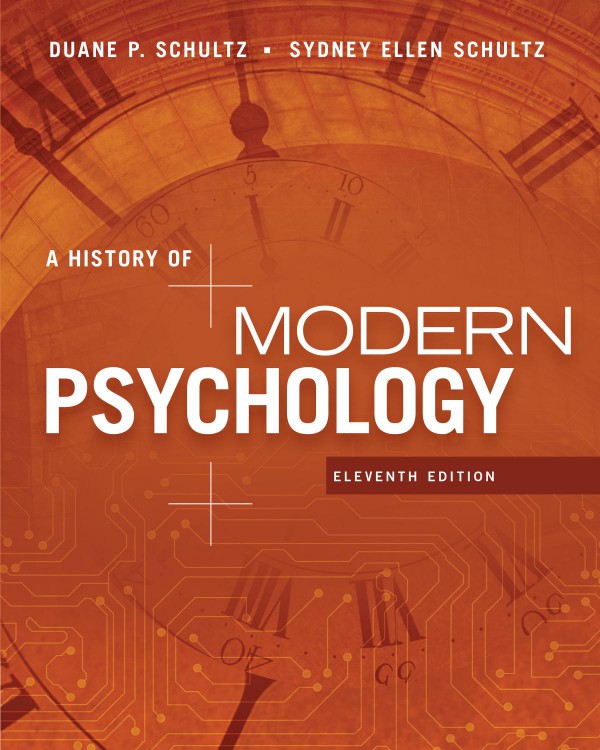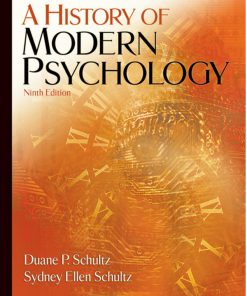A History of Modern Psychology 11th Edition by Duane Schultz, Sydney Ellen Schult 1305630041 9781305630048
$50.00 Original price was: $50.00.$25.00Current price is: $25.00.
Authors:Duane P. Schultz; Sydney Ellen Schultz , Series:Psychology [129] , Tags:Psychology; History , Author sort:Schultz, Duane P. & Schultz, Sydney Ellen , Ids:9781305548916 , Languages:Languages:eng , Published:Published:Jun 2015 , Publisher:Cengage Learning , Comments:Comments:A market leader for over 30 years, A HISTORY OF MODERN PSYCHOLOGY has been praised for its comprehensive coverage and biographical approach. Focusing on modern psychology, the text’s coverage begins with the late 19th century. The authors personalize the history of psychology not only by using biographical information on influential theorists, but also by showing how the major events in the theorists’ lives affected their ideas, approaches, and methods. Substantial updates in the eleventh edition include discussions of the latest developments in positive psychology; the increasing role of brain science in psychology; the return of Freud’s anal personality; Ada Lovelace, the virgin Bride of Science; the interpretation of dreams by computers; the use of Coca Cola as a nerve tonic, and many other topics. The result is a text that is as timely and relevant today as it was when it was first introduced.Important Notice: Media content referenced within the product description or the product text may not be available in the ebook version.
A History of Modern Psychology 11th Edition by Duane Schultz, Sydney Ellen Schult – Ebook PDF Instant Download/Delivery. 1305630041, 9781305630048
Full download A History of Modern Psychology 11th Edition after payment

Product details:
ISBN 10: 1305630041
ISBN 13: 9781305630048
Author: Duane P. Schultz; Sydney Ellen Schult
A market leader for over 30 years, A HISTORY OF MODERN PSYCHOLOGY has been praised for its comprehensive coverage and biographical approach. Focusing on modern psychology, the text’s coverage begins with the late 19th century. The authors personalize the history of psychology not only by using biographical information on influential theorists, but also by showing how the major events in the theorists’ lives affected their ideas, approaches, and methods. Substantial updates in the eleventh edition include discussions of the latest developments in positive psychology; the increasing role of brain science in psychology; the return of Freud’s anal personality; Ada Lovelace, the virgin “”Bride of Science””; the interpretation of dreams by computers; the use of Coca Cola as a “”nerve tonic,”” and many other topics. The result is a text that is as timely and relevant today as it was when it was first introduced.
A History of Modern Psychology 11th Table of contents:
Chapter 1. The Study of the History of Psychology
Did You See the Clown? What about the Gorilla?
Why Study the History of Psychology?
The Beginning of Modern Psychology
The Data of History: Reconstructing Psychology’s Past: How Do We Know What Really Happened?
History Lost and Found
Altered and Hidden History
Changing the Words of History: Distortion in Translation
In Context: Forces That Shaped Psychology
Jobs
Wars
Prejudice and Discrimination
A Final Note
Conceptions of Scientific History
The Personalistic Theory
The Naturalistic Theory
Schools of Thought in the Evolution of Modern Psychology
Plan of the Book
Review Questions
Recommended Resources
Chapter 2. Philosophical Influences on Psychology
The Defecating Duck
The Spirit of Mechanism
The Clockwork Universe
Determinism and Reductionism
Automata
People as Machines
The Calculating Engine
The Bride of Science
The Beginnings of Modern Science
Rene Descartes (1596–1650)
The Contributions of Descartes: Mechanism and the Mind-Body Problem
The Nature of the Body
The Mind-Body Interaction
The Doctrine of Ideas
Philosophical Foundations of the New Psychology: Positivism, Materialism, and Empiricism
Auguste Comte (1798–1857)
John Locke (1632–1704)
George Berkeley (1685–1753)
James Mill (1773–1836)
John Stuart Mill (1806–1873)
Contributions of Empiricism to Psychology
Review Questions
Recommended Resources
Chapter 3. Physiological Influences on Psychology
David K. Loses His Job: It Was about Time
The Importance of the Human Observer
Developments in Early Physiology
Research on Brain Functions: Mapping from the Inside
Research on Brain Functions: Mapping from the Outside
Shocking Research on the Nervous System
The Impact of the Mechanistic Spirit
The Beginnings of Experimental Psychology
Why Germany?
Hermann von Helmholtz (1821–1894)
Helmholtz’s Life
Helmholtz’s Contributions to the New Psychology
Ernst Weber (1795–1878)
Two-Point Thresholds
Just Noticeable Differences
Gustav Theodor Fechner (1801–1887)
Fechner’s Life
Mind and Body: A Quantitative Relationship
Methods of Psychophysics
The Formal Founding of Psychology
Review Questions
Recommended Resources
Chapter 4. The New Psychology
No Multitasking Allowed
The Founding Father of Modern Psychology
Wilhelm Wundt (1832–1920)
Wundt’s Life
The Leipzig Years
Wundt’s Multimedia Classroom
Cultural Psychology
The Study of Conscious Experience
The Method of Introspection
Elements of Conscious Experience
Organizing the Elements of Conscious Experience
The Fate of Wundt’s Psychology in Germany
Criticisms of Wundtian Psychology
Wundt’s Legacy
Other Developments in German Psychology
Hermann Ebbinghaus (1850–1909)
Ebbinghaus’s Life
Research on Learning
Research with Nonsense Syllables
Other Contributions to Psychology
Franz Brentano (1838–1917)
The Study of Mental Acts
Carl Stumpf (1848–1936)
Phenomenology
Oswald Külpe (1862–1915)
Külpe’s Differences with Wundt
Systematic Experimental Introspection
Imageless Thought
Research Topics of the Würzburg Laboratory
Comment
Review Questions
Recommended Resources
Chapter 5. Structuralism
Would You Swallow a Rubber Tube?
Edward Bradford Titchener (1867–1927)
Titchener’s Life: “Your Whiskers Are on Fire”
Titchener’s Experimentalists: No Women Allowed!
The Content of Conscious Experience
The Stimulus Error
Introspection
The Elements of Consciousness
Was Titchener Changing His Approach?
Criticisms of Structuralism
Criticisms of Introspection
Additional Criticisms of Titchener’s System
Contributions of Structuralism
Review Questions
Recommended Resources
Chapter 6. Functionalism: Antecedent Influences
The Man Who Came to See Jenny
The Functionalist Protest in Psychology
Evolution before Darwin
The Inevitability of Evolution
The Life of Darwin (1809–1882)
Forced to Go Public by a Man in a Jungle
On the Origin of Species by Means of Natural Selection
The Finches’ Beaks and Minnesota Mice: Evolution at Work
Darwin’s Influence on Psychology
Individual Differences: Francis Galton (1822–1911)
Galton’s Life
Mental Inheritance
Statistical Methods
Mental Tests
The Association of Ideas
Mental Imagery
Arithmetic by Smell and Other Bizarre Topics
Comment
Animal Psychology and the Development of Functionalism
George John Romanes (1848–1894)
C. Lloyd Morgan (1852–1936)
Comment
Review Questions
Recommended Resources
Chapter 7. Functionalism: Development and Founding
The Philosopher Who Wore Earmuffs
Evolution Comes to America: Herbert Spencer (1820–1903)
Social Darwinism
Synthetic Philosophy
The Continuing Evolution of Machines
Herman Hollerith and the Punched Cards
William James (1842–1910): Anticipator of Functional Psychology
James’s Life
Family life
The Subject Matter of Psychology: A New Look at Consciousness
The Methods of Psychology
Pragmatism
The Theory of Emotions
The Three-Part Self
Habit
The Functional Inequality of Women
Mary Whiton Calkins (1863–1930)
The Variability Hypothesis
Helen Bradford Thompson Woolley (1874–1947)
Leta Stetter Hollingworth (1886–1939)
Granville Stanley Hall (1844–1924)
Hall’s Life
Evolution and the Recapitulation Theory of Development
Comment
The Founding of Functionalism
The Chicago School
John Dewey (1859–1952)
The Reflex Arc
Comment
James Rowland Angell (1869–1949)
Angell’s Life
The Province of Functional Psychology
Comment
Functionalism at Columbia University
Robert Sessions Woodworth (1869–1962)
Woodworth’s Life
Dynamic Psychology
Criticisms of Functionalism
Contributions of Functionalism
Review Questions
Recommended Resources
Chapter 8. Applied Psychology: The Legacy of Functionalism
Drug Bust: Psychology to the Rescue
Toward a Practical Psychology
The Growth of American Psychology
Psychology Goes Public
Economic Influences on Applied Psychology
Mental Testing
James McKeen Cattell (1860–1944)
Studying with Wundt
Studying with Galton
Mental Tests
Comment
The Psychological Testing Movement
Binet, Terman, and the IQ Test
Mental Age
World War I and Group Intelligence Testing
Group Personality Tests
Public Acceptance of Testing
Ideas from Medicine and Engineering
Racial Differences in Intelligence
Cultural Bias in Tests
Contributions of Women to the Testing Movement
The Clinical Psychology Movement
Lightner Witmer (1867–1956)
Witmer’s Life
Clinics for Child Evaluation
Comment
The Growth of Clinical Psychology
The Industrial-Organizational Psychology Movement
Walter Dill Scott (1869–1955)
Scott’s Life
Advertising and Human Suggestibility
Employee Selection
Comment
The Impact of the World Wars
The Hawthorne Studies and Organizational Issues
Lillian Gilbreth
Hugo Münsterberg (1863–1916)
Münsterberg’s Life
Coming to America
Forensic Psychology and Eyewitness Testimony
Psychotherapy
Industrial Psychology
Comment
Applied Psychology in the United States: A National Mania
Comment
Review Questions
Recommended Resources
Chapter 9. Behaviorism: Antecedent Influences
Clever Hans, the Clever Horse
Toward a Science of Behavior
Then Came the Revolution
The Role of Positivism
The Influence of Animal Psychology on Behaviorism
Jacques Loeb (1859–1924)
Rats, Ants, and the Animal Mind
It Was Not Easy Being an Animal Psychologist
Toward a More Objective Animal Psychology
Was Clever Hans Really Clever?
Edward Lee Thorndike (1874–1949)
Thorndike’s Life
Leaving His Animals Behind
Connectionism
The Puzzle Box
Laws of Learning
Comment
Ivan Petrovich Pavlov (1849–1936)
Pavlov’s Life
Life at Home
Life in the Laboratory
A Living Legend
Conditioned Reflexes
Lost in Obscurity: Knee Jerks and Goldfish
Comment
Vladimir M. Bekhterev (1857–1927)
Associated Reflexes
Comment
The Influence of Functional Psychology on Behaviorism
Changing the Direction of Psychology
Review Questions
Recommended Resources
Chapter 10. Behaviorism: The Beginnings
The Psychologist, the Baby, and the Hammer: Don’t Try This at Home
What Became of Little Albert?
John B. Watson (1878–1958)
Watson’s Life
Off to Graduate School
The Development of Behaviorism
Watson’s Views on Women
The Reaction to Watson’s Program
The Methods of Behaviorism
Continuing the Mechanistic Tradition
The Subject Matter of Behaviorism
Instincts
Emotions
Albert, Peter, and the Rabbits
Thought Processes
Behaviorism’s Popular Appeal
A Brave New World
An Outbreak of Psychology
Criticisms of Watson’s Behaviorism
Karl Lashley (1890–1958)
William McDougall (1871–1938)
The Watson–McDougall Debate
Contributions of Watson’s Behaviorism
Review Questions
Recommended Resources
Chapter 11. Behaviorism: After the Founding
The IQ Zoo
Three Stages of Behaviorism
Operationism
Edward Chace Tolman (1886–1959)
Purposive Behaviorism
Intervening Variables
Learning Theory
Comment
Clark Leonard Hull (1884–1952)
Hull’s Life
The Spirit of Mechanism Ran Deep
Objective Methodology and Quantification
Drives
Learning
Comment
B. F. Skinner (1904–1990)
Skinner’s Life
To College and Graduate School
To the End
Skinner’s Behaviorism
Operant Conditioning
Schedules of Reinforcement
Successive Approximation: The Shaping of Behavior
Baby in a Box
Pigeons Go to War
Walden Two—A Behaviorist Society
Behavior Modification
Criticisms of Skinner’s Behaviorism
Contributions of Skinner’s Behaviorism
Sociobehaviorism: The Cognitive Challenge
Albert Bandura (1925– )
Social Cognitive Theory
Vicarious Reinforcement
Models in Our Lives
Violence on the Screen and in Real Life
Self-Efficacy: Believing You Can
Research Results on Self-Efficacy
Collective Efficacy
Behavior Modification
Comment
Julian Rotter (1916–2014)
Cognitive Processes
Locus of Control
A Chance Discovery
Comment
The Fate of Behaviorism
Review Questions
Recommended Resources
Chapter 12. Gestalt Psychology
A Sudden Insight
The Gestalt Revolt
More to Perception than Meets the Eye
Antecedent Influences on Gestalt Psychology
The Changing Zeitgeist in Physics
The Phi Phenomenon: A Challenge to Wundtian Psychology
Max Wertheimer (1880–1943)
Kurt Koffka (1886–1941)
Wolfgang Köhler (1887–1967)
The Nature of the Gestalt Revolt
Perceptual Constancies
A Matter of Definition
Gestalt Principles of Perceptual Organization
Gestalt Studies of Learning: Insight and the Mentality of Apes
Comment
Productive Thinking in Humans
Isomorphism
The Spread of Gestalt Psychology
The Battle with Behaviorism
Gestalt Psychology in Nazi Germany
Field Theory: Kurt Lewin (1890–1947)
Lewin’s Life
The Life Space
Motivation and the Zeigarnik Effect
Social Psychology
Criticisms of Gestalt Psychology
Contributions of Gestalt Psychology
Review Questions
Recommended Resources
Chapter 13. Psychoanalysis: The Beginnings
Was It Only a Dream?
The Development of Psychoanalysis
A New School of Thought
Antecedent Influences on Psychoanalysis
Early Theories of the Unconscious Mind
The Unconscious Goes Public
Early Approaches to Treating Mental Disorders
More Humane Treatment
The Development of Psychiatric Treatment
Hypnosis
Hypnosis Becomes Respectable: Charcot and Janet
The Influence of Charles Darwin
Sex before Freud
Catharsis and Dreaming before Freud
Sigmund Freud (1856–1939)
Freud’s Use of Cocaine
Marriage and Children
The Strange Case of Anna O.
The Sexual Basis of Neurosis
Studies on Hysteria
The Childhood Seduction Controversy
Freud’s Sex Life
Freud’s Neurosis
Freud’s Analysis of His Dreams
The Pinnacle of Success
Freud Comes to America
Dissent, Illness, and Escape
Freud’s Methods of Treatment
Freud as a Therapist
Freud and Traditional Psychology
Psychoanalysis as a System of Personality
Instincts
Levels of Personality
Anxiety
Psychosexual Stages of Personality Development
Mechanism and Determinism in Freud’s System
Psychoanalysis versus Academic Psychology
The Scientific Validation of Psychoanalytic Concepts
Criticisms of Psychoanalysis
Data Collection
Views on Women
Contributions of Psychoanalysis
American Popular Culture and Psychoanalysis
Review Questions
Recommended Resources
Chapter 14. Psychoanalysis: After the Founding
A Lost, Lonely Little Boy
Competing Factions in Psychoanalysis
The Neo-Freudians and Ego Psychology
Anna Freud (1895–1982)
An Unhappy Childhood
A Crisis of Identity
Child Analysis
Comment
Carl Jung (1875–1961)
Jung’s Life: Another Terrible Childhood
Freud, the Father
A Breakdown
Jung’s Analytical Psychology
The Collective Unconscious
Archetypes
Introversion and Extraversion
Psychological Types: The Functions and Attitudes
Comment
Social Psychological Theories: The Zeitgeist Strikes Again
Alfred Adler (1870–1937)
Adler’s Early Life
Becoming a Celebrity in America
Individual Psychology
Inferiority Feelings
Style of Life
The Creative Power of the Self
Birth Order
Reactions to Adler’s Views
Research Support
Comment
Karen Horney (1885–1952)
Horney and Her Father
Marriage, Depression, and Sex
Disagreements with Freud
Basic Anxiety
Neurotic Needs
The Idealized Self-Image
Horney and Feminism
Comment
The Evolution of Personality Theory: Humanistic Psychology
Antecedent Influences on Humanistic Psychology
The Nature of Humanistic Psychology
Abraham Maslow (1908–1970)
Maslow’s Early Years
Watching a Parade
Self-Actualization
Comment
Carl Rogers (1902–1987)
A Solitary Child
Bizarre Fantasies
A Breakdown
Self-Actualization
Fully Functioning People
Comment
Contributions of Humanistic Psychology
Positive Psychology: The Science of Happiness
Martin Seligman (1942–)
A Tough Adolescence
The Rapid Growth of Positive Psychology
Money and Happiness
Health and Age
Marriage
Personality
Other Factors Influencing Happiness
Which Comes First: Happiness or Success?
Flourishing: A New Level of Happiness
Comment
The Psychoanalytic Tradition: A Final Comment
Review Questions
Recommended Resources
Chapter 15. Continuing Developments in Psychology
Try It—You Might Like It
Chess Champion Capitulates to Cunning Computer
Schools of Thought: Looking Back
Structuralism, Functionalism, and Gestalt Psychology
Behaviorism and Psychoanalysis
The Cognitive Movement in Psychology
Antecedent Influences on Cognitive Psychology
The Changing Model of Physics
The Evolution of Cognitive Psychology
George Miller (1920–2012)
Love Conquers
Harvard and the Magical Number Seven
The Center for Cognitive Studies
An Idea Whose Time Had Come
Ulric Neisser (1928–2012)
An Outsider
Defining Himself
Changing Course
From Clocks to Computers
The Development of the Modern Computer
Artificial Intelligence
The Life of Alan Turing (1912–1954)
Turing and Snow White
Gross Indecency
The Turing Test
The Chinese Room Problem
Passing the Turing Test
The Chess Champ
The Nature of Cognitive Psychology
Cognitive Neuroscience
A New Phrenology?
Thinking Can Make It So
The Return of Introspection
Unconscious Cognition
Not the Same Unconscious
A Smart Unconscious
Animal Cognition: The Return of Animals Who Think
Not Everyone Agrees That Animals Can Think
Animal Personality
Current Status of Cognitive Psychology
Trappings of Success
Embedded Cognition
Cognitive Overload
Critics of the Cognitive Movement
Evolutionary Psychology
Biology More Important than Learning
Is There Unity in Psychology at Last?
Antecedent Influences on Evolutionary Psychology
William James
Behaviorism
Predisposing Tendencies
The Cognitive Revolution
The Influence of Sociobiology
Current Status of Evolutionary Psychology
History in the Making: There Is No End to It
Review Questions
Recommended Resources
People also search for A History of Modern Psychology 11th:
historical background of modern psychology
a history of modern psychology chapter summaries
history of modern psychology 11th edition
the history of modern psychology
You may also like…
eBook PDF
An Introduction to the History of Psychology 6th Edition by Hergenhahn 0495506214 978-0495506218
eBook PDF
Theories of Personality 9th Edition by Duane Schultz, Sydney Ellen Schultz 0495506257 978-0495506256












